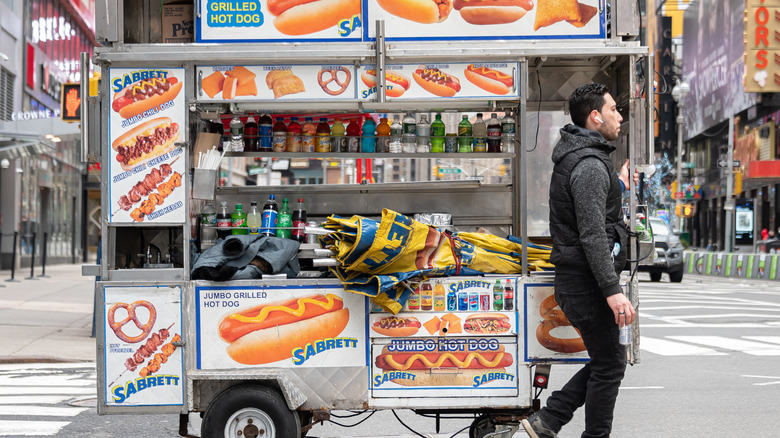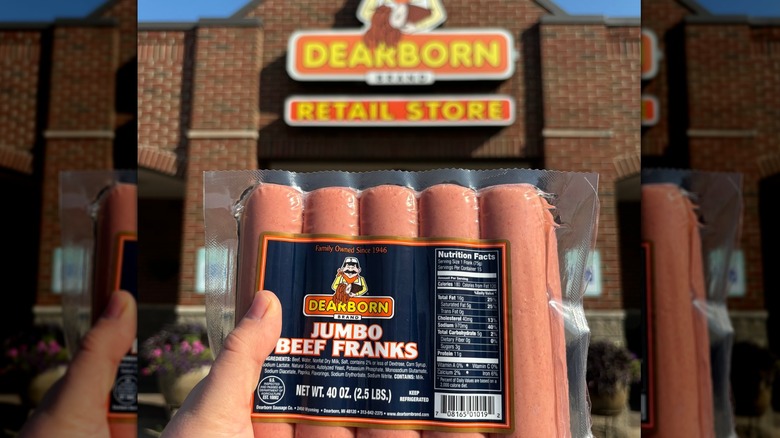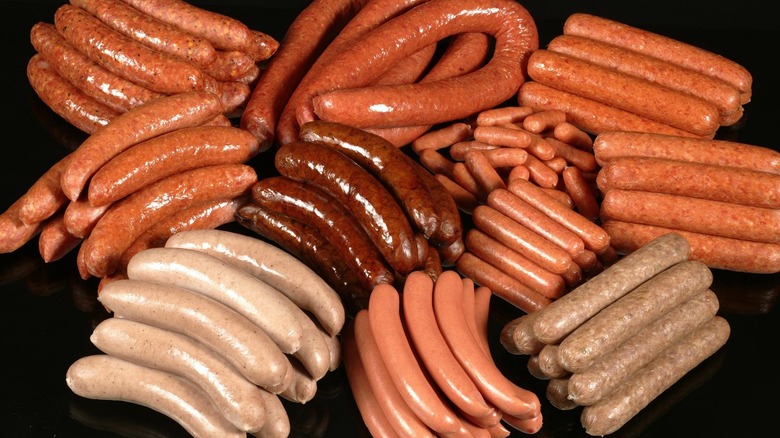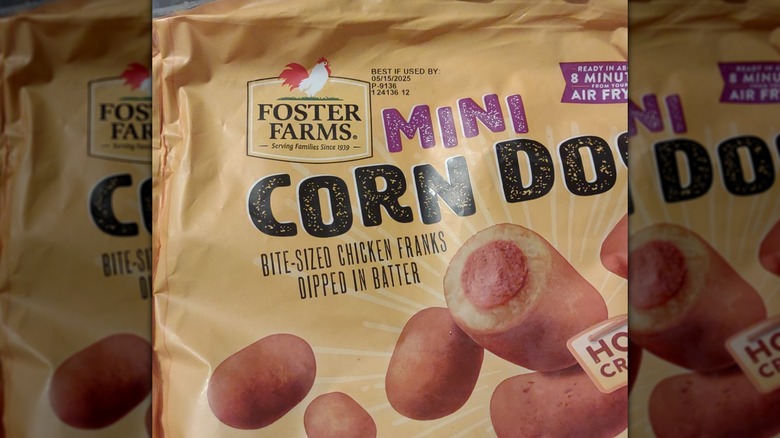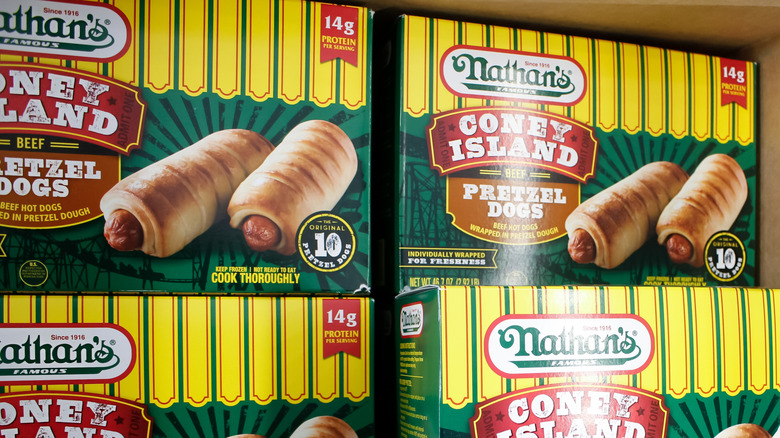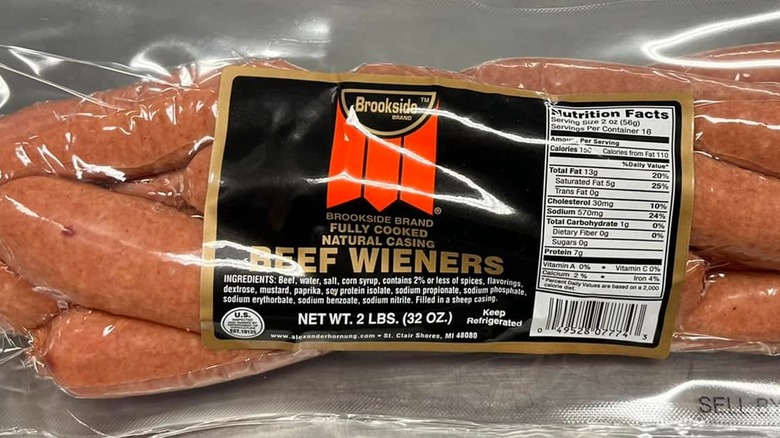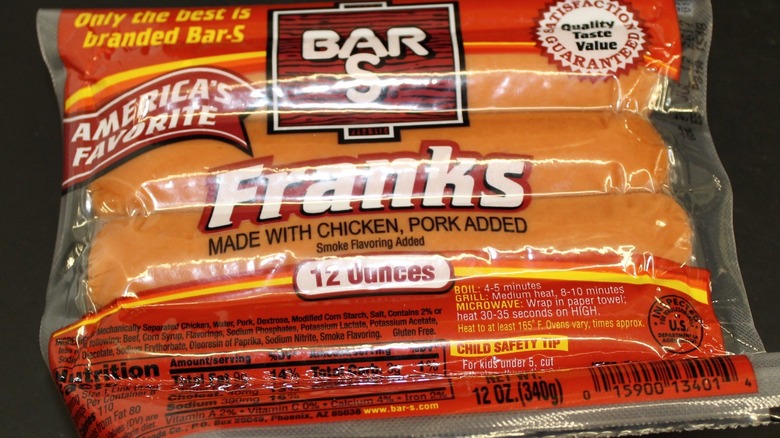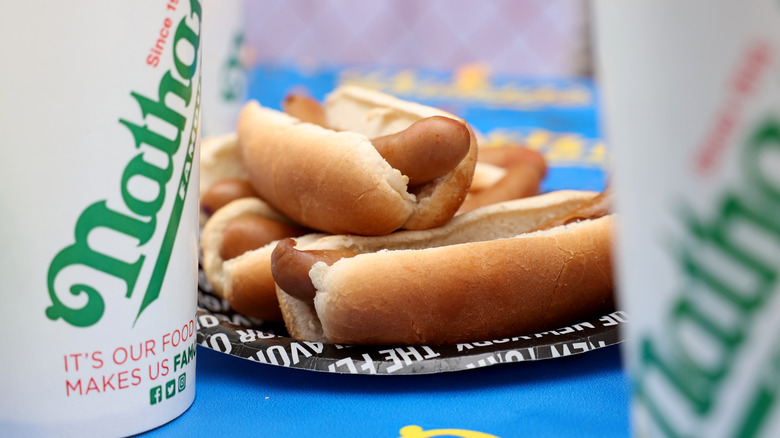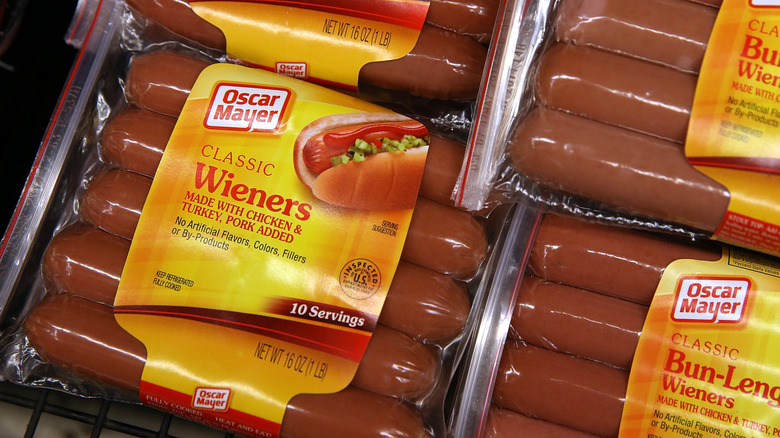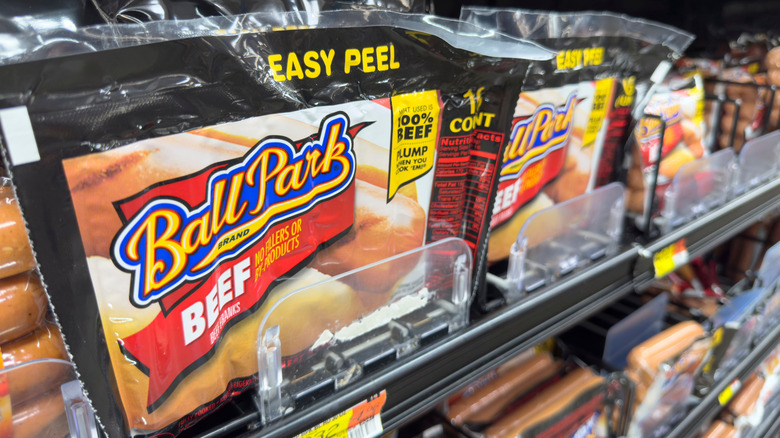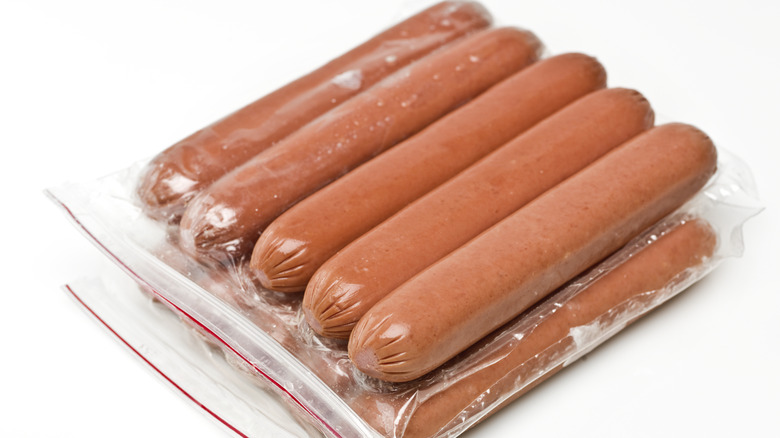Hot Dog Recalls That Affected Millions
The hot dog occupies a strange spot where popularity and controversy meet. Hot dogs topped with everyone's favorite condiments are the featured food at cookouts and they are ubiquitous at convenience stores and fast food chains alike. Most supermarkets devote a large portion of refrigerator shelf space to wieners and franks, all with varying sizes, meats used, and special fillings.
Hot dogs have a long history but, perhaps because they are typically very cheap, they have always carried a shady reputation for being made of nefarious ingredients. The process of grinding and encasing meat that has been finely ground and mixed with spices and preservatives is an obscuring and forgiving one. And once in a while, the hot dog detractors are actually proven right.
A processed meats company or a government agency will sometimes announce an urgent recall of a large number of hot dogs. They have different reasons, like contamination with foreign bodies or the possibility that they carry food-borne illness. No matter the cause, modern food history is marred by a shockingly large number of take-backs covering both both high- and low-quality grocery store hot dogs. Here are the largest hot dog recalls in history that made the biggest impacts, potentially affecting millions of consumers.
Sabrett hot dogs went back because of bone fragments
New York City is famous for its all-American hot dogs, and with its army of thousands of umbrella-laden street carts, Sabrett is one of the United States' most prolific hot dog sellers. Vendors are absolutely everywhere in New York City, providing one of the oldest and easiest forms of fast food — and to many, the tastiest. The magnitude of Sabrett's saturation can be understood by the breadth of a hot dog recall that affected those mobile units.
In July 2017, the U.S. Department of Agriculture helped Sabrett recall more than a staggering 7 million pounds of hot dogs. All produced at a Bronx meat processing factory operated by Marathon Enterprises, those wieners and sausages were distributed around the United States, but primarily to the greater New York area. Recalled specifically were hot dogs made at the Marathon plant between March 17 and July 4 of 2017, which were the lots identified as those most likely to contain fragments of bone and pieces of cartilage from the animals used to make the product. The investigation which resulted in the recall was launched after Sabrett received multiple complaints from customers who found those unwelcome hard and chewy chunks inside their hot dogs.
Beef and pork hot dogs were mislabeled by the Dearborn Sausage Company
The Michigan-headquartered Dearborn Sausage Company produces an array of hot dogs and similar products, using variously beef, pork, and soy. In 2024, about 2,000 pounds of Dearborn hot dogs that had been sent to Ohio for sale in supermarkets were accidentally packed with the wrong labels on them. All-beef wieners were bundled with labels listing them as containing beef and pork, and the beef-and-pork hot dogs were marked as the beef-only ones. Moreover, the just-beef ones contained soy. This means some of the product left a facility without soy, a common food allergen, listed on the label; those who can't eat soy without falling ill were exposed to danger.
As for the pork and beef switch, that also presented a risk of consumers eating something they did not intend to eat. Muslim and Jewish people following halal and kosher diets, respectively, eschew pork; had someone religiously adherent eaten one of those affected hot dogs without knowing there was pig meat in it, they would have violated their own dietary code. The U.S. Department of Agriculture's Food Safety and Inspection Service led the September 2024 recall, but also suggested that customers throw away mislabeled hot dogs.
Kent recalled 140 tons of sausage because it did not mention the soy
Hydrolyzed soy protein is a safe-to-eat, highly processed additive used in industrial food production around the world. Derived by breaking down soybeans to their constituent chemical substances, it takes the form of a salty and savory powder, and it is often used by big food operations as a filler and flavor enhancer. It is a long way from whole soy, but it is still really soy, and if products sold in the U.S. use hydrolyzed soy protein, the labels must mention it — soy is among the most common triggers in people with food allergies and sensitivities.
In May 2018, Kent Quality Foods, a meat processor based in the U.K., recalled 140 tons — roughly 308,000 pounds — of hot dogs and sausages intended for sale in the United States. During an inventory inspection, authorities at the U.S. Department of Agriculture discovered that the spice combination used in the making of its Beef Polish Sausage contained hydrolyzed soy protein, but that the label did not list soy on the ingredient panel. It was the only Kent product that directly and secretly contained soy, but the recall was so substantial because of contaminated equipment not being properly cleaned after the soy-containing sausages were processed and packaged.
Mini corn dogs were returned because of weird taste and odors
Corn dogs are a staple of Midwestern state fairs, and there is a lot to love about a perfectly cooked hot dog enrobed in sweetened cornmeal that is then deep fried. The festival treat is also a briskly selling frozen food in the U.S., particularly in its shrunken-down, stick-free form, marketed by poultry producer Foster Farms as Mini Corn Dogs. In 2023, Foster Farms asked for the public to return just under 77,000 pounds' worth of 1.83-pound, 40-count frozen bags of chicken franks wrapped in corn batter. The company received several complaints from customers that the Foster Farms Mini Corn Dogs had tasted weird, smelled strange, or had an off-kilter appearance. To Foster Farms, and the U.S. Department of Agriculture, all those symptoms suggested premature food spoilage — the corn dogs had turned before they had even hit supermarket freezers — yikes.
The USDA did not lodge any reports about people getting sick from eating the spoiled mini corn dogs, but illness was a distinct possibility, which is why Foster Farms went to the trouble of a recall. The company asked those who had bought the potentially illness-causing products to either return them to stores for a refund, or to throw away the uneaten corn dogs just in case.
No allergy labeling led to a massive pretzel dog recall
Nathan's Famous is one of the biggest hot dog brands going, selling its wieners in supermarkets and at a chain of almost 270 locations across the United States. It also licenses out its name and product to be sold in 15 other countries worldwide. Nathan's Famous is just one of many lines of frozen pretzel dogs made and distributed by City Line Foods Manufacturing. The Pennsylvania company also produces pretzel bread-wrapped franks for Berks, Kunzler, West Creek, Auntie Anne's, and its own name.
In 2014, City Line recalled multiple varieties of those brands of pretzel dogs to the tune of 1.2 million pounds in total. The company had applied soy lecithin to machinery to make things operate more smoothly, contaminating the large number of pretzel dogs made on the same equipment. Those products then contained traces of soy, a common food allergen, without declaring it on the pretzel dogs' various labels. While City Line dutifully asked for the return of more than a million pounds of product, only about 281,000 found their way back to their point of origin.
Brookside Smoked Sausages contained milk, and the company did not announce that
Perdue is one of the United States' oldest and most successful meat producers. It has historically been focused on chicken, but it distributes other meats in other forms under subsidiary brands. One Perdue-controlled entity, Brookside Smoked Sausage, made headlines in 2023 when, just before the major grills and cookouts of Independence Day, it recalled a significant number of hot dogs.
About 3,200 pounds of Brookside Brand Fully Cooked Natural Casing Beef Wieners were distributed to stores around Ohio in early May 2023. At a production facility, a quantity of smoked sausage was incorrectly labeled and shipped out as hot dogs. Shipping out the incorrect product is enough cause to order a recall, but this situation proved potentially dangerous. Brookside Smoked Sausages are made with a small amount of milk, meaning they should have a note about that on the packaging, to warn dairy-sensitive or allergic consumers. Since these milk-containing sausages hit stores as dairy-free hot dogs, some customers may have gotten sick or experienced an allergic reaction.
Wilson recalled hot dogs twice because it neglected to cook them
Eating a mass-produced hot dog "raw," meaning straight out of the package and cold, without heating it up in any way, is mostly safe. They are pre-cooked to kill off germs before sealing the food in plastic, so it is okay for all but those most likely to contract food-borne illness to eat them that way. But if they are not fully cooked by the processor before they hit the stores, consumers across the board would be at risk of illnesses, such as listeria, were they to eat those frankfurters raw.
In 1994, wiener maker Wilson Foods Corp. recalled an entire day's worth of production of Wilson's Hot Dogs and Corn King's Jumbo Dogs. The problem was that the Arkansas facility where they were processed had failed to fully cook the franks, creating an opportunity for harmful bacteria to develop. That made for a lot of hot dogs that could not be sold or confidently eaten: 114 tons in all. Remarkably, a year earlier Wilson put a recall in place for the same reason. In 1993, the processor pulled back 20 tons of hot dogs which had not been properly cooked.
Listeria led to a big Bar-S recall
In addition to several varieties of lunchmeat, sausage, bacon, and smoked sausages, Bar-S manufactures a few kinds of hot dogs, some made with pork and chicken, others with beef, as well as corn dogs. The company touts itself as the most inexpensive processed luncheon meat and frank brand in the United States, but it certainly experienced a value-depleting financial downturn and a dip in consumer confidence due to a large-scale recall in 2016.
Working with the U.S. Department of Agriculture on the recall, Bar-S urged customers to return several products that had been made during four days in July 2016. No complaints of illness from customers were reported, but a Bar-S plant was potentially exposed to listeria at the time. This bacteria causes a rough sickness, with symptoms including diarrhea, fever, nausea, and vomiting. More than 372,000 pounds of hot dogs were recalled, involving five products, notably Bar-S Classic Bun Length Franks, Bar-S Classic Franks, and Bar-S Classic Corn Dogs.
Metal fragments were found in franks from Nathan's Famous and Vienna Beef
The Nathan's Famous Hot Dog Eating Contest helped make Nathan's a household name in the world of wieners. Each year, the world's top competitive eaters put away a truckload of Nathan's Famous hot dogs, but they may have had reservations during 2017's contest, which occurred less than six weeks after the frankfurter provider's parent company John Morrell announced a major recall.
Nathan's Famous received word from three different parties that they had found metal in hot dogs. An investigation determined that all the metal-laced items had been produced in the same facility on January 26, 2017. On May 22, 2017, Nathan's Famous announced a recall of all the outstanding product from that day — a total of 210,606 pounds of hot dogs. Fortunately, beyond the initial reports of discovery, Nathan's Famous did not field any complaints about injuries arising from anyone accidentally ingesting metal.
Two years later, Vienna Beef enacted a similar recall of some of its hot dogs for another metal scandal. The U.S. Department of Agriculture's Food Safety and Inspection Service warned that eating the product covered by the recall — hot dogs contaminated by small but troublesome fragments of metal — could cause health issues or injury. In May 2019, Vienna Beef recalled recalling 2,030 pounds of franks meant for use in restaurants in three Midwestern states.
Oscar Mayer had a way to recall five tons of cheese dogs
Its famous commercial jingle discusses the fantasy of being "an Oscar Mayer wiener." That implies that this Kraft-Heinz subsidiary makes just one kind of frankfurter, when it actually makes lots, including the aptly named Classic Wieners as well as Cheese Stuffed Hot Dogs. The latter are made with three ribbons of processed cheese coursing through the meat, which go melty on cooking. Being made with cheese, it may be obvious that it contains milk, but Oscar Mayer did not mention that on the labels of thousands of hot dogs it packed and shipped in 2014.
Due to a mix-up somewhere on the production line, Cheese Stuffed Hot Dogs were placed into plastic bags with labels that incorrectly identified them as Classic Wieners. Because consumers with a dairy sensitivity or allergy could have consumed those hot dogs, assuming they were cheese-free, illness or injury could have resulted from this. In April 2014, Oscar Mayer recalled about 96,000 pounds of the wrongly-labeled hot dogs.
Two listeria outbreaks were linked to Ball Park franks
One of the most brutal of food-borne illnesses, listeriosis can lead to many difficult gastrointestinal issues, and in more serious cases, muscular and neurological problems. Babies, older adults, and people with compromised immunity can even die from listeria. A 1998 listeria outbreak proved particularly tragic — more than 100 people became severely ill, six pregnant women suffered miscarriages, and 15 people died.
One of the primary foods responsible for all that death and devastation was hot dogs made by the Sara Lee Corporation. In December 1998, Sara Lee began the complicated task of recalling about 15 million pounds of processed, listeria-contaminated meat products. Sara Lee Deli Meat and Home Roast were ordered back, as were the company's hot dogs sold under the brand names Bryan Bunsize, Grillmaster, and Ball Park Franks. A federal court held Sara Lee criminally and financially responsible for selling tainted meat. After entering a guilty plea, the company was ordered to pay the maximum fine legally allowed, $200,000, and agreed to make a $3 million donation to a Michigan State University food safety research program.
Before that case was even settled in 2001, however, Sara Lee had to undertake another hot dog recall. In March 2000, the company asked customers to return 34,500 pounds of Ball Park Franks over concerns that they were, again, infected with listeria.
Uninspected meat left an AW Farms facility
AW Farms produces meat for industrial clients in the South and Midwest, including restaurants and hotels. The company makes and sells hot dogs in high volumes under brand names including Geo Brown and French City Foods. In July 2024, AW Farms put a recall in place for 6,900 pounds of hot dogs that it had already sent out to dining rooms throughout West Virginia and Ohio. 10-pound boxes of hot dogs, some made with pork and beef, others with just beef, and some with maple flavoring, were requested to be returned to the company that made them.
The U.S. Department of Agriculture's Food Safety and Inspection Service, and the Kentucky-based AW Farms, believed the recall of more than three tons of franks to be justified and necessary because of the possibility of contamination. Nothing sickening was discovered in AW Farms' hot dogs before the recall, but that was exactly the problem. All that food, produced around late May of 2024, hadn't been approved or even looked at by federal meat inspectors.

